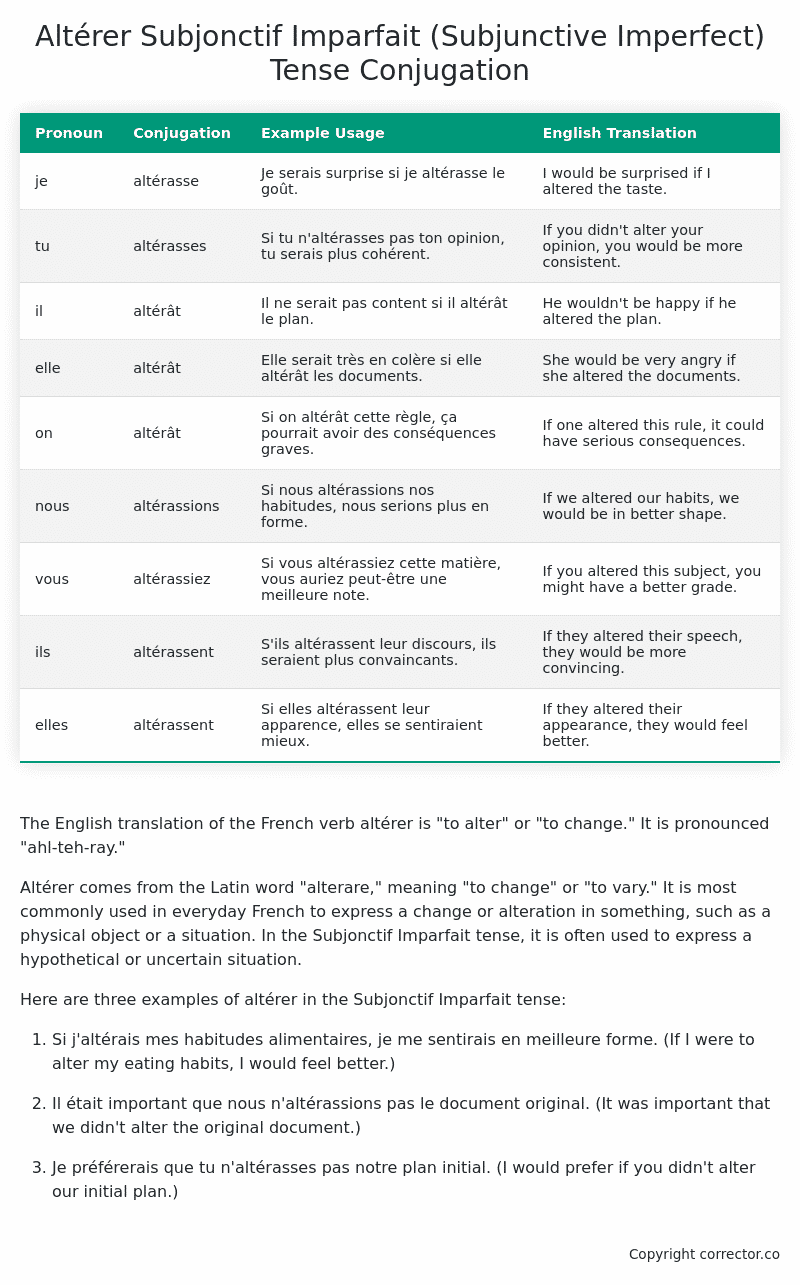Subjonctif Imparfait (Subjunctive Imperfect) Tense Conjugation of the French Verb altérer
Introduction to the verb altérer
The English translation of the French verb altérer is “to alter” or “to change.” It is pronounced “ahl-teh-ray.”
Altérer comes from the Latin word “alterare,” meaning “to change” or “to vary.” It is most commonly used in everyday French to express a change or alteration in something, such as a physical object or a situation. In the Subjonctif Imparfait tense, it is often used to express a hypothetical or uncertain situation.
Here are three examples of altérer in the Subjonctif Imparfait tense:
-
Si j’altérais mes habitudes alimentaires, je me sentirais en meilleure forme. (If I were to alter my eating habits, I would feel better.)
-
Il était important que nous n’altérassions pas le document original. (It was important that we didn’t alter the original document.)
-
Je préférerais que tu n’altérasses pas notre plan initial. (I would prefer if you didn’t alter our initial plan.)
Table of the Subjonctif Imparfait (Subjunctive Imperfect) Tense Conjugation of altérer
| Pronoun | Conjugation | Example Usage | English Translation |
|---|---|---|---|
| je | altérasse | Je serais surprise si je altérasse le goût. | I would be surprised if I altered the taste. |
| tu | altérasses | Si tu n’altérasses pas ton opinion, tu serais plus cohérent. | If you didn’t alter your opinion, you would be more consistent. |
| il | altérât | Il ne serait pas content si il altérât le plan. | He wouldn’t be happy if he altered the plan. |
| elle | altérât | Elle serait très en colère si elle altérât les documents. | She would be very angry if she altered the documents. |
| on | altérât | Si on altérât cette règle, ça pourrait avoir des conséquences graves. | If one altered this rule, it could have serious consequences. |
| nous | altérassions | Si nous altérassions nos habitudes, nous serions plus en forme. | If we altered our habits, we would be in better shape. |
| vous | altérassiez | Si vous altérassiez cette matière, vous auriez peut-être une meilleure note. | If you altered this subject, you might have a better grade. |
| ils | altérassent | S’ils altérassent leur discours, ils seraient plus convaincants. | If they altered their speech, they would be more convincing. |
| elles | altérassent | Si elles altérassent leur apparence, elles se sentiraient mieux. | If they altered their appearance, they would feel better. |
Other Conjugations for Altérer.
Le Present (Present Tense) Conjugation of the French Verb altérer
Imparfait (Imperfect) Tense Conjugation of the French Verb altérer
Passé Simple (Simple Past) Tense Conjugation of the French Verb altérer
Passé Composé (Present Perfect) Tense Conjugation of the French Verb altérer
Futur Simple (Simple Future) Tense Conjugation of the French Verb altérer
Futur Proche (Near Future) Tense Conjugation of the French Verb altérer
Plus-que-parfait (Pluperfect) Tense Conjugation of the French Verb altérer
Passé Antérieur (Past Anterior) Tense Conjugation of the French Verb altérer
Futur Antérieur (Future Anterior) Tense Conjugation of the French Verb altérer
Subjonctif Présent (Subjunctive Present) Tense Conjugation of the French Verb altérer
Subjonctif Passé (Subjunctive Past) Tense Conjugation of the French Verb altérer
Subjonctif Imparfait (Subjunctive Imperfect) Tense Conjugation of the French Verb altérer (this article)
Subjonctif Plus-que-parfait (Subjunctive Pluperfect) Tense Conjugation of the French Verb altérer
Conditionnel Présent (Conditional Present) Tense Conjugation of the French Verb altérer
Conditionnel Passé (Conditional Past) Tense Conjugation of the French Verb altérer
L’impératif Présent (Imperative Present) Tense Conjugation of the French Verb altérer
L’infinitif Présent (Infinitive Present) Tense Conjugation of the French Verb altérer
Struggling with French verbs or the language in general? Why not use our free French Grammar Checker – no registration required!
Get a FREE Download Study Sheet of this Conjugation 🔥
Simply right click the image below, click “save image” and get your free reference for the altérer Subjonctif Imparfait tense conjugation!

Altérer – About the French Subjonctif Imparfait (Subjunctive Imperfect) Tense
Formation
Common Everyday Usage Patterns
Interactions with Other Tenses
Subjonctif Présent
Indicatif Passé Composé
Conditional
Conditional Perfect
Summary
I hope you enjoyed this article on the verb altérer. Still in a learning mood? Check out another TOTALLY random French verb conjugation!


